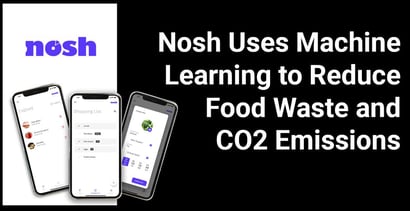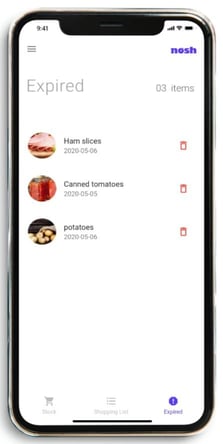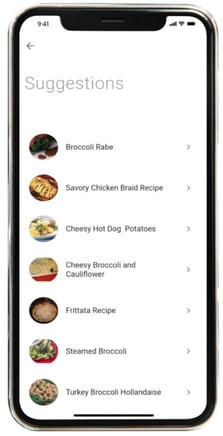
In a Nutshell: While studying in the UK, Somdip Dey learned his parents back home in India had been severely injured in an auto accident. Dey sent them all his money to help with medical expenses, forcing him to resort to dumpster diving to survive. That humbling experience taught him that expiration and best-before dates on food packages don’t indicate the food is spoiled. After pandemic restrictions exacerbated the food waste issue and its environmental impact, Dey created Nosh to track expiration and use-by dates with machine learning. Nosh helps people use what they have and generate less CO2 by minimizing unnecessary purchases.
If you live in a highly developed nation such as the UK or the US, you may not realize the extent of your prosperity. Go dumpster-diving to discover edible food and other valuable items people throw away because it’s too much trouble to use, sell, or even give them away.
That’s the message from Dr. Somdip Dey, CEO and Chief Scientist at Nosh, an app that aims to revolutionize food consumption by reducing food waste and CO2 emissions from excess production.
Nosh uses machine learning to track food expiration and use-by dates to help people use what they have and minimize unnecessary purchases. It also offers recipe suggestions to create new and exciting dishes from existing pantry items.

In February 2024, Dey received a £50,000 Unlocking Potential Award from Innovate UK, the UK’s national innovation agency, to continue developing the app.
“Every year, we waste more than 1.3 billion tons of food worldwide, while food wastage contributes to almost 10% of global carbon emissions. Astonishingly, a third of all food produced is never consumed,” Dey said in a press release announcing the award.
Inspiration for Nosh came from Dey’s experience with dumpster-diving. As an expat from India studying computer systems engineering in the UK, Dey sent all his money home to help his parents pay medical bills after an auto accident. He survived for days on the perfectly edible food he found in campus dumpsters while awaiting his next compensation check.
“Looking back now, it was one of the proudest episodes in my life — students were throwing away completely edible food within the expiration dates,” Dey said. “Consumers think food becomes inedible when expiration and use-by dates lapse. That’s not true.”
Scan Receipts and Manually Input Pantry Items
Dey’s student peers discarded much more than food in those dumpsters. He discovered items such as new book-carry backpacks that he deduced were undesirable because the colors weren’t stylish. His parents’ accident occurred immediately before the summer holiday, a period when many students relocated. Dey surmised his peers trashed many items rather than transport them home or to new accommodations.
Dey developed the world’s first crowd food sharing platform in 2014 to help combat food waste, with other developers and entrepreneurs following suit with technologies to help consumers reduce waste and save money.

But he realized more needed to be done when the issue of food waste came to the fore as the COVID-19 pandemic forced quarantines and shutdowns in the UK.
At the time, Dey was working toward a PhD in computer science and electronic engineering at the University of Essex. He received his degree in 2022. Nosh is the result of Dey’s work to apply machine learning principles to the issue of food waste and its environmental impact.
Through his firm, Nosh Technologies, Dey and his team work on behalf of the agri-food industry on complex challenges related to artificial intelligence, blockchain, and cloud computing. Nosh is a consumer-facing application built to be simple to use.
The current iteration of the app enables users to input food items manually or scan receipts. It then asks the user to input expiration or use-by dates. As of February 2024, the team is working on functionality to estimate use-by dates to eliminate the latter step.
“Nosh uses machine learning in the background to understand how the user purchases and consumes food products,” Dey said. “The app aims to give better analytics to the consumer to make better future decisions.”
Use What You Have and Understand Use-By Dates
Manual input and receipt scanning put food items in a stock list according to expiration, best-before, or use-by dates. Notifications remind users of upcoming expirations to help them plan and prepare.
That sets up another problem. Focus group research by Nosh Technologies revealed that many users, particularly professionals and students under 25, tend not to cook at home. When not dining out, they tend to go for readymade takeout dishes. That results in the haphazard use of the grocery and kitchen items they bring home.

The app uses machine learning to alleviate those food-utilization challenges through a recipe recommendation feature tailor-made for younger cohorts. It helps them cook and consume what they have, reducing their carbon footprint.
“Sometimes people don’t know what to do with items they don’t want to consume the way they are,” Dey said. “And if they’ve already had something, they probably don’t want it again.”
The recipe feature draws on household food-use patterns and public data to recommend new applications for about-to-expire products. New recipes make items attractive again, so it’s more likely the user will consume them.
The Nosh team has recently added weekly meal-prepping functionality to supplement the recipe recommendation feature. Users now know what’s in their pantries, cupboards, and fridges, what’s about to expire, how to use it to create something new, and what to anticipate over the coming week.
The app even learns user preferences to improve recommendations.
The use-by dates are crucial. Dey stresses that the dates don’t denote spoilage or unsuitability, only the arbitrary arrival of a freshness threshold that may have more marketing power than anything else.
“Our app helps people live a better life when it comes to food consumption,” Dey said.
Save While Combating Food Waste’s Environmental Impact
The Innovate UK Unlocking Potential Award will help the Nosh team refine its algorithms to make the app more personalized and precise. The goal is to gain a holistic understanding of global food consumption patterns, purchasing habits, and regional seasonal produce availability.
The final result will be a recommendation app tailored to households that can curb waste and carbon emissions and save money without user input.

“We envision a future where households are empowered with the knowledge to make informed decisions, reducing their carbon footprint and promoting sustainability. By leveraging the power of machine learning, we hope to pave the way for smarter consumption patterns, one household at a time, ensuring that food ends up on plates, not in bins,” Dey said in the Innovate UK press release.
Focus group research has already revealed that individual Nosh users can save up to £30, and households with two or more members can save up to £50 monthly. Additional functionality to offer machine-learning-based shopping discounts is currently being tested in the UK.
Dey focused his PhD work on developing machine learning algorithms that learn user behavior in an anonymized fashion. User privacy is essential at Nosh as the team builds new ways for the app to perform actions on user data. The app aims to account for user behavior, purchasing activity, consumption patterns, and waste worldwide, making individual user privacy an imperative.
Nosh has already helped consumers save more than 590,000 different food products and more than 290 tons in CO2 emissions. Dey hopes the app engenders a more profound respect for food and material things as its user base grows.
“I created Nosh due to what I experienced surviving on food waste,” Dey said. “We hope to improve it further and help more people.”






